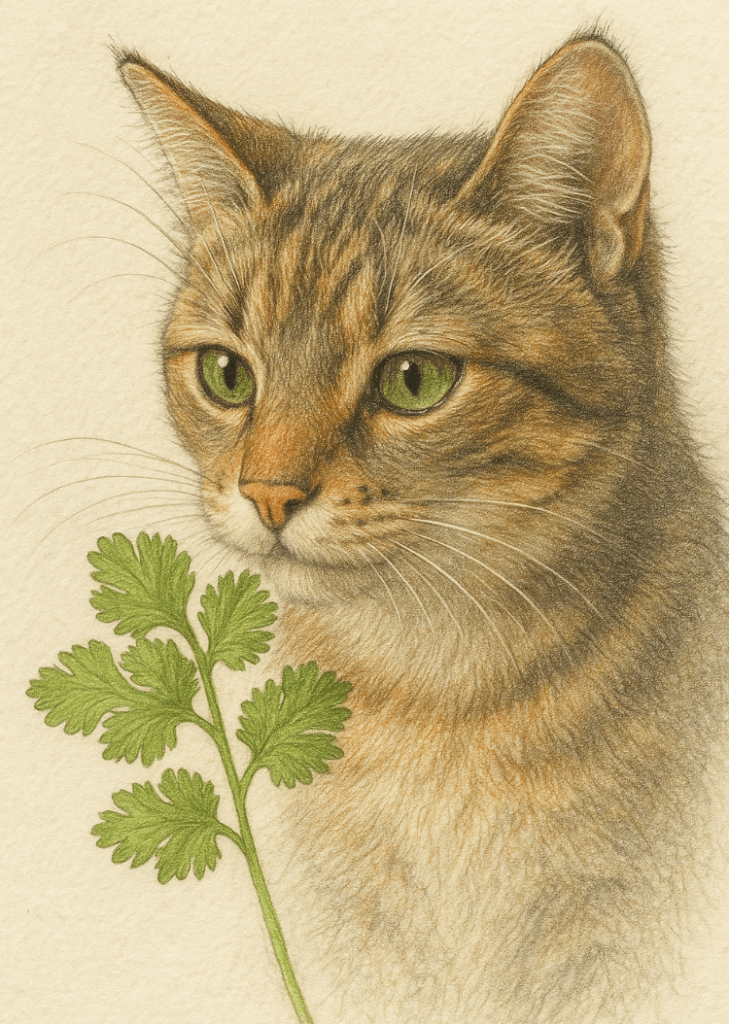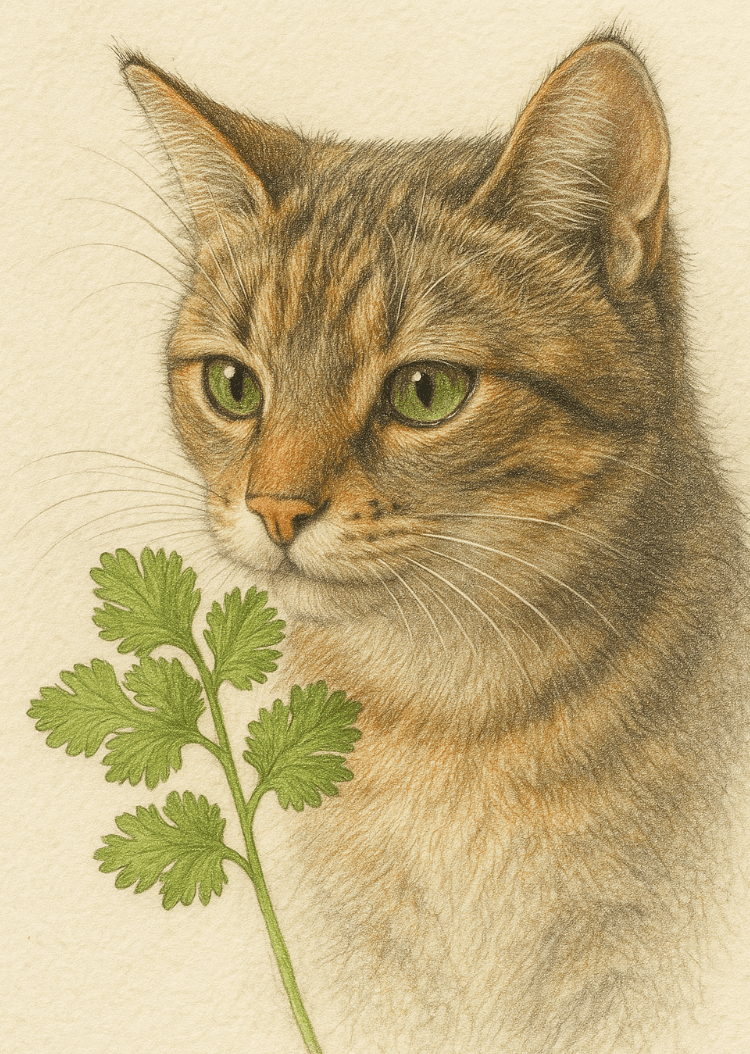Can Cats Eat Cilantro?
Cats are curious creatures, and their tendency to nibble on plants or herbs can leave pet owners wondering about the safety of certain foods. One common question is whether cats can eat cilantro, a popular herb used in many cuisines worldwide. While cilantro is safe for humans and adds flavor to dishes, its effects on feline health aren’t as widely known. Understanding what your cat can and cannot consume is vital for ensuring their well-being. In this blog post, we’ll explore everything you need to know about cats and cilantro, from potential benefits to risks and safer alternatives. By the end, you’ll have the knowledge to make informed decisions about your furry friend’s diet.
Is Cilantro Safe for Cats?
When it comes to feeding your cat cilantro, safety is the primary concern. While small amounts of cilantro are generally considered non-toxic, there are still factors to consider before offering it to your feline companion.
Non-Toxic Classification:
According to experts, cilantro is not toxic to cats, meaning it won’t cause immediate harm if consumed in small quantities.Limited Digestive Ability:
Cats are obligate carnivores, meaning their bodies are designed to process meat rather than plant matter like herbs.Potential Allergic Reactions:
Some cats may experience mild allergic reactions, such as itching or gastrointestinal upset, after consuming cilantro.Low Nutritional Value for Cats:
While cilantro contains vitamins and antioxidants beneficial to humans, cats derive little to no nutritional benefit from it.Risk of Overconsumption:
Eating large amounts of cilantro can lead to digestive issues like vomiting or diarrhea in cats.
While cilantro isn’t inherently dangerous, moderation and caution are key when introducing it to your cat’s diet.
Potential Benefits of Cilantro for Cats (In Moderation)
Although cilantro isn’t a dietary necessity for cats, it does offer some minor benefits when given sparingly. These advantages are limited but worth noting for curious pet owners.
Antioxidant Properties:
Cilantro contains antioxidants that may help neutralize free radicals, though cats don’t rely on plant-based sources for these compounds.Fresh Breath Aid:
Chewing on fresh cilantro leaves might temporarily improve your cat’s breath by reducing odor-causing bacteria.Mild Hydration Boost:
The high water content in cilantro can contribute to your cat’s hydration, especially if they’re reluctant drinkers.Encourages Exploration:
Offering small amounts of cilantro can satisfy your cat’s curiosity about new textures and flavors.Natural Pesticide Properties:
Some studies suggest cilantro has mild insect-repellent qualities, which could indirectly benefit your pet during outdoor adventures.
While these benefits exist, they should be weighed against the lack of significant nutritional value for cats.
Check this guide 👉Can Cats Eat Oatmeal? Best 7 Expert Tips!
Check this guide 👉Can Cats Eat Almonds? Best 7 Expert Tips!
Check this guide 👉Can Cats Eat Raspberries? Best 7 Expert Tips!

Safe Herbs for Cats | Herbs to Avoid Feeding Cats |
|---|---|
Catnip | Garlic |
Parsley | Onions |
Mint | Chives |
Basil | Leeks |
Thyme | Shallots |
How to Safely Introduce Cilantro to Your Cat
If you decide to let your cat try cilantro, it’s important to do so safely and responsibly. Follow these guidelines to minimize risks and ensure a positive experience.
Start with Small Amounts:
Offer just a tiny piece of cilantro leaf to gauge your cat’s reaction before giving more.Observe for Adverse Reactions:
Watch for signs of digestive upset, such as vomiting, diarrhea, or excessive drooling, after consumption.Avoid Seasoned or Cooked Cilantro:
Stick to plain, raw cilantro—avoid anything mixed with spices, oils, or other ingredients harmful to cats.Provide Fresh Water:
Ensure your cat has access to fresh water to help digest the herb and stay hydrated.Consult Your Veterinarian:
Before introducing any new food, including cilantro, seek advice from your vet to confirm it’s suitable for your cat.
By following these steps, you can safely determine whether cilantro agrees with your cat’s unique preferences and needs.
Signs Your Cat May Not Tolerate Cilantro
Even if cilantro is deemed safe, some cats may not tolerate it well. Recognizing warning signs early allows you to act quickly and protect your pet’s health.
Vomiting or Diarrhea:
These symptoms indicate that your cat’s digestive system is struggling to process the herb.Excessive Drooling:
Drooling can signal irritation or discomfort caused by consuming cilantro.Lethargy or Discomfort:
A sudden lack of energy or visible signs of pain suggest your cat may be unwell.Loss of Appetite:
Refusal to eat regular meals after trying cilantro could indicate an adverse reaction.Pawing at the Mouth:
This behavior often points to oral irritation or difficulty swallowing.
If you notice any of these signs, remove cilantro from your cat’s environment and consult your veterinarian promptly.
Common Mistakes to Avoid When Feeding Herbs to Cats
Feeding herbs to cats requires careful consideration to avoid mistakes that could harm their health. Here are some pitfalls to watch out for.
Assuming All Herbs Are Safe:
Many herbs, like garlic and onions, are toxic to cats despite being harmless to humans.Ignoring Individual Tolerance Levels:
Each cat reacts differently to herbs; what’s safe for one may upset another.Overfeeding Herbs:
Even safe herbs can cause digestive issues if consumed in large quantities.Using Seasoned or Processed Herbs:
Spices, oils, and additives can make otherwise safe herbs harmful to cats.Skipping Veterinary Advice:
Always consult your vet before introducing new foods or herbs to your cat’s diet.
Avoiding these mistakes ensures a safer and healthier experience for your cat.
Alternatives to Cilantro That Cats May Enjoy
If your cat shows interest in herbs but doesn’t tolerate cilantro well, there are plenty of alternatives that are both safe and enjoyable.
Catnip:
Known for its euphoric effect on cats, catnip is a favorite among felines and completely safe in moderation.Parsley:
Rich in nutrients, parsley can freshen breath and aid digestion without causing harm.Mint Leaves:
Some cats enjoy the scent and taste of mint, which can also promote oral hygiene.Basil:
This fragrant herb is non-toxic and may appeal to cats who enjoy exploring new flavors.Thyme:
Often used in pet supplements, thyme is gentle on a cat’s stomach and provides mild antioxidant benefits.
These alternatives allow you to cater to your cat’s curiosity while keeping them safe.
Understanding Your Cat’s Natural Instincts Around Herbs
Cats are naturally drawn to certain herbs due to their evolutionary instincts and sensory preferences. Understanding why they interact with herbs helps explain their behavior.
Curiosity Driven by Smell:
Cats have a keen sense of smell and may investigate herbs simply because they find the aroma intriguing.Self-Medicating Behavior:
Some believe cats chew on herbs instinctively to address minor ailments, though this theory lacks conclusive evidence.Playful Exploration:
Cats use their mouths to explore new objects, and herbs provide an interesting texture to investigate.Attraction to Catnip-Like Compounds:
Certain herbs contain compounds similar to nepetalactone, the active ingredient in catnip, which attracts cats.Territorial Marking:
Rubbing against or chewing herbs may serve as a way for cats to mark their territory or relieve stress.
By recognizing these behaviors, you can better address your cat’s needs in a safe and controlled manner.
Frequently Asked Questions About Cats and Cilantro
Can kittens eat cilantro?
Kittens have sensitive digestive systems, so it’s best to avoid feeding them cilantro altogether.
What should I do if my cat eats a lot of cilantro?
Monitor your cat closely for signs of illness and contact your vet if symptoms arise.
Does cilantro repel fleas in cats?
There’s no scientific evidence supporting cilantro as a flea repellent for cats; use vet-approved treatments instead.
Can cats eat cooked cilantro?
Cooked cilantro is less likely to cause harm but should still be avoided due to added seasonings or oils.
Are there better herbs for cats than cilantro?
Yes, catnip and parsley are safer and more appealing options for most cats.
Prioritizing Your Cat’s Health When It Comes to Cilantro
While cilantro isn’t toxic to cats, it offers minimal nutritional value and should only be offered in moderation. Understanding your cat’s dietary needs and observing their reactions to new foods ensures their safety and well-being. Always prioritize consultation with your veterinarian before introducing unfamiliar items into your cat’s diet. Remember, a happy and healthy cat relies on a balanced diet tailored to their carnivorous nature. By staying informed and attentive, you can continue providing the best care for your beloved feline companion.
Do Cats Have Taste Buds? Best 7 Expert Tips! – Discover how cats experience flavors and why their taste is so unique.
Do Dogs Have Taste Buds? Best 7 Expert Tips! – Discover how dogs experience taste, their preferences, and what it means for their diet and health.
Can Cats Taste Sweet? Best 7 Expert Tips! – Discover why cats can’t taste sweetness, how it affects their diet, and tips to keep them healthy and happy.
Can Dogs Taste Sweet? Best 7 Expert Tips! – Discover how dogs perceive sweetness, which foods are safe, and tips to manage their sweet cravings responsibly.





